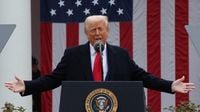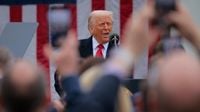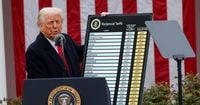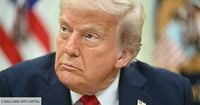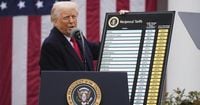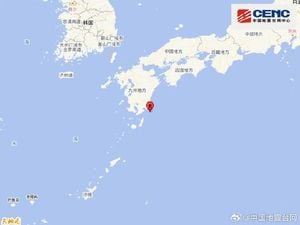On April 2, 2025, Donald Trump made a bold proclamation as he marked what he dubbed "Liberation Day" with sweeping new tariffs aimed at reshaping international trade dynamics. In a move that has sent shockwaves through global markets, the former president announced the establishment of reciprocal tariffs for all countries, a strategy he claims will protect American jobs and revitalize the economy.
During a press conference held at the White House, Trump signed a decree that imposes a minimum tariff of 10% on all foreign imports. Moreover, he confirmed a staggering 25% additional tax on all automobiles manufactured abroad, a decision that could significantly impact European car manufacturers and increase costs for American consumers.
According to the White House, these tariffs could generate as much as $600 billion annually for the federal government, funds that Trump suggests will help finance his promised tax cuts. "This is a historic day for America," Trump asserted, framing the tariffs as a necessary response to what he characterized as decades of unfair trade practices by foreign nations.
The implications of Trump's tariff strategy are profound. Canada’s Prime Minister, Mark Carney, stated that the new tariffs would "fundamentally change international trade," while Ireland’s Prime Minister, Micheál Martin, expressed deep regret over the 20% tariffs imposed on EU goods, calling for a proportionate response from European nations.
In Italy, Prime Minister Giorgia Meloni condemned the tariffs as a "bad measure," warning that a trade war would ultimately weaken the West. Meanwhile, Australia's Prime Minister, Anthony Albanese, labeled the tariffs as "totally unjustified," indicating that they would alter the longstanding relationship between Australia and the United States.
As the tariffs are set to take effect in two phases—on April 5 for the minimum tariffs and April 9 for the targeted surcharges—global markets reacted negatively. The New York Stock Exchange opened lower, with major indices like the Dow Jones and Nasdaq experiencing declines shortly after Trump’s announcement.
In a further escalation, Trump signed a decree canceling the previous exemption for small packages sent from China, which had allowed companies like Shein and Temu to flourish in the U.S. market. This move is expected to complicate the already tense trade relationship between the U.S. and China, where products will now be subjected to a hefty 34% tariff.
"Reciprocal means: what they do to us, we do to them. It couldn’t be simpler," Trump declared, emphasizing his administration’s commitment to protecting American industries from foreign competition. He criticized the European Union for imposing tariffs on American goods and highlighted the need for a more balanced trade relationship.
The automotive sector, in particular, is bracing for the impact of these tariffs. Ford, General Motors, and other manufacturers have reported strong sales in March as consumers rushed to purchase vehicles before the new taxes take effect. However, industry experts warn that the additional costs could lead to higher prices for consumers and potentially stifle demand in the long run.
Economists are divided on the effectiveness of Trump’s tariff strategy. While he claims it will lead to job creation and economic growth, many experts caution that such protectionist measures could provoke retaliatory actions from other nations, leading to a possible trade war that could harm the global economy.
François Villeroy de Galhau, a member of the European Central Bank, stated that the tariffs should not significantly hinder the ongoing disinflation in Europe, while Christine Lagarde, the ECB president, noted that the impact of the tariffs is uncertain and depends on their scope and duration.
In response to the tariffs, the European Union is preparing its countermeasures, with a spokesperson indicating that a coordinated response would be announced by the end of April. The fear among European leaders is that a tit-for-tat escalation could ensue, adversely affecting both sides of the Atlantic.
Meanwhile, the Confederation of Small and Medium Enterprises (CPME) in France has voiced concerns about the economic repercussions of these tariffs, fearing a chain reaction of reciprocal increases that could hurt consumers and businesses alike. "Once you start raising tariffs, it’s hard to know when it will stop," warned CPME President Amir Reza-Tofighi.
As the dust settles from Trump’s latest announcements, one thing is clear: the landscape of international trade is shifting dramatically. With the U.S. taking a more aggressive stance, countries around the world are left to navigate a complex web of tariffs and trade relations that could have lasting implications for the global economy.
In conclusion, Trump’s new tariff policies represent a significant departure from traditional free trade principles, signaling a potential era of heightened protectionism. As nations react and adapt to these changes, the future of global trade remains uncertain, with many stakeholders closely monitoring the unfolding developments.
